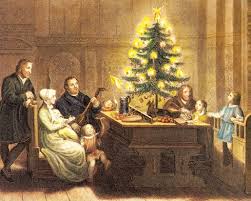“The only thing that is constant, is change.”
The only thing that is constant, is change. Quite a paradox, isn’t it? These are words attributed to Heraclitus, a Greek philosopher who was born in the 6th century B.C. And these words summarize his philosophy: everything changes all the time. Everything is in flux. Everything is constantly becoming something else, and that includes us human beings: we are born, we grow up, we grow old, we die, we rise again.
For Heraclitus, it’s not about being, it’s about becoming.
And I think we can all agree with Heraclitus that things, indeed, change all the time. Just think about the changes that happened in our lifetimes alone. There are historical changes –think about WWII, the division of Germany and the reunification of Germany – most of you experienced all that. There are changes in technology – heck, I still grew up with a phone where you had to turn a dial when you called someone. And today? We use cell phones that are very sophisticated mini computers.
There are societal changes. Our societies become more diverse and less homogeneous. Whereas it was the ideal for women to be a stay-at-home mom and take good care of the household and family until just a couple of decades ago, today it is normal for them to be part of the workforce and to have positions of great responsibility and power.
Or think about how children were raised once upon a time and how they are raised now. Helicopter parents – parents, who hover over their children all the time – or snowplow parents – those, who want to get any obstacles out of their children’s way, like those folks who recently were caught up in the college admission scandal – were almost non-existent even when I grew up in the 70s, and I suspect even less so when most of you were children.
Things change. There is a new thing, we get used to it, it becomes normal, but then there is yet another new thing, we eventually get used to it, and it becomes the new normal. And so on and so on. Everything was a new thing at some point, revolutionary. Just think about it.
And yes, of course we sometimes long for the good old days, times when things supposedly were easier and simpler and less complicated and confusing. But deep within our hearts, we know that these times will never come again. We can’t turn back time.
But then there are not only big changes that happen all around us. We all have experienced changes in our lives, for better and for worse. For example: We fall in love and marry. We have children. We fall out of love. Relationships fall apart. We get a job, we lose a job, we get another job, we retire. We move from one place to another, sometimes involuntarily. We grow older and feel the aches and pains. We lose people who are close to us, maybe a spouse to whom we were married for many, many years.
And once these or other things happen in our lives, things are never the same again, right? We have to adjust, we have deal with such changes, we have get used to the new normal. We know that, after changes happen, things will never be the same again, no matter, how much we wish they were, no matter, how hard we try.
And that’s not necessarily bad, it doesn’t need to drive us into despair. We heard in today’s psalm how there is hope for renewal, even after we experience trauma and grief: ‘You turned my mourning into dancing, you have taken off my sackcloth and clothed me with joy.’ We just have to give God a chance to take the pieces of our lives and create something new, to give us new life.
Things changed rather quickly for the disciples. One day, they witness Jesus’ triumphant entrance into Jerusalem. Then, within a few days, Jesus is arrested, is crucified and dies. This sequence of events alone is like a whirlwind; the disciples barely have time to catch up with all that. Without Jesus, everything they have hoped and worked for seems to have been in vain, and they are lost.
No wonder the grieving disciples hide away for a while, catching their breath, trying to regroup. What’s next?
And then on the third day after Jesus was crucified, the women tell them that Jesus is risen from the dead. They can’t believe it at first, and we heard that story last Sunday, but once they get it, once they remember how Jesus had told them all about his death and resurrection, once their mourning is turned into dancing, they – still don’t know what to do with this wonderful news. There is too much they have to deal with, just too much to think about. The question remains: what’s next?
Peter, the fisherman, invites his friends and fellow disciples to go fishing. It looks like he wants to go back to the old normal, he maybe wants to pick up the pieces where he left them when he dropped his nets to follow Jesus. But he and the others soon realize: things will never be the same after they walked the roads with Jesus, after they witnessed his death, after he appeared to them once he rose from the dead. They go fishing, but ‘they caught nothing’, as we read in today’s gospel story. The old ways just don’t work anymore. That much they realize. But the question remains: What’s next?
At that point, the risen Christ appears to them, although at first he seems to be a stranger. And he gives them much needed direction: fish over there, to your right. And lo and behold, their nets are filled to the brim. That’s when the disciples recognize Christ.
But of course in the end it’s not about fishing, at least not in the sense of catching fish. As Peter and the other fishermen were called by Jesus in the beginning, he told them that from now on, they were to fish for people. Christ reminds them of this shift, he reminds them that they, by following him, have signed on to a new way life, to a new way of living. And this continues, even and especially after Jesus’ death and resurrection. It’s not over.
And in the big showdown between Jesus and Peter, it becomes very clear what’s next. Here Peter, who denied Jesus three times before he was sentenced to death and died on the cross, is given a chance to rehabilitate himself. Three times, Jesus asks: Peter, do you love me? And each time, Peter replies, ‘Yes, you know that I do, Lord.’
But each time Peter confesses his love for his master, Jesus gives him a command: Feed my lambs. Tend my sheep. Feed my sheep. Jesus reminds Peter and the other disciples, who witness this exchange – and by implication, Jesus also reminds us – that it is not enough to give lip service, but that love for Christ extends into our actions in this world. We take care of each other, we take care of God’s beautiful and diverse flock, the lost and the found. God’s love, grace and mercy transform us into the people of God. Our faith in Christ, our faith in the newness of life, our Easter joy translate into faithful living. Faith changes us. God’s love changes us. Nothing can ever be the same. We are given a new life, eternal life – and it starts here and now.
This is at the heart of the Easter message. This is what gives us hope and confidence to live this new life and be advocates for all things living – and the living God who makes all things new and turns our mourning into dancing.
Heraclitus may say that all things change – but I beg to differ with him as it comes to God, the one who was and is and will be forevermore, the one constant power and presence of love and grace and live that sustains all. To remind us of this power and presence in all the changes we experience in our lives, I would like to close with some beautiful words by German writer and poet Friedrich von Schiller from his poem ‘Worte des Glaubens’, ‘Words of Faith’:
Und ein Gott ist, ein heiliger Wille lebt, Wie auch der menschliche wanke. Hoch über Zeit und dem Raume webt Lebendig der hӧchste Gedanke. Und ob alles im ewigen Wechsel kreist, Es beharret im Wechsel ein ruhiger Geist.
And one God there is, a Will divine,
However man’s own will may waver;
Supremely above all space and all time
The living Idea moves forever.
And though all’s e’er-changing in form and in scene,
Within that change rests a spirit serene.
Picture by Suzanne D. Williams on unsplash.com





